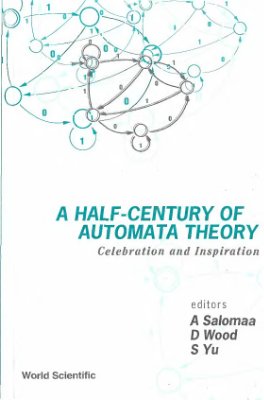Издательство World Scientific Publishing, 2001, -164 pp.
In the past half century, automata theory has been established as one of the most important foundations of computer science, and its applications have spread to almost all areas of computer science. Research in automata theory and related areas has also reached a crucial point where researchers are searching for new directions.
To celebrate the achievements in automata theory in the past half century and to promote further research in the area, a celebratory symposium was organized, where eleven distinguished pioneers were invited to reminisce about the development of automata theory and to suggest possible future directions from their personal experiences and perspectives. The symposium, called "Half Century of Automata Theory" (HCAT), was held on Wednesday, July 26, 2000 at the University of Weste Ontario, in London, Ontario, Canada, The invited speakers included John Brzozowski, Sheila Greibach, Michael Harrison, Juris Hartmanis, John Hopcroft, Weer Kuich, Robert McNaughton, Maurice Nivat, Michael Rabin, Grzegorz Rozenberg (who was unable to attend due to sickness), and Arto Salomaa. Note that Juris Hartmanis, John Hopcroft, and Michael Rabin are ACM Turing Award winners.
The topics of their talks were ranging from general observations and predictions of the development of automata theory to specific topics which were considered to link the past to the future. In his talk at HCAT, John Hopcroft said: "Today there is another fundamental change taking place. We are in the situation right now which is very similar to what automata theory and theoretical computer science were in the 1960's. And I think in the next 20 years, it would be every bit as exciting". He also mentioned that "Automata theory may be poised for another period of significant advance, similar to that which occurred in the 1960's and 1970's".
Hazard Algebras (Extended Abstract)
Undecidability and Incompleteness Results in Automata Theory
Automata Theory: Its Past and Future
Forty Years of Formal Power Series in Automata Theory
Playing Infinite Games in Finite Time
Gene Assembly in Ciliates: Computing by Folding and Recombination
Compositions over a Finite Domain: From Completeness to Synchronizable Automata
In the past half century, automata theory has been established as one of the most important foundations of computer science, and its applications have spread to almost all areas of computer science. Research in automata theory and related areas has also reached a crucial point where researchers are searching for new directions.
To celebrate the achievements in automata theory in the past half century and to promote further research in the area, a celebratory symposium was organized, where eleven distinguished pioneers were invited to reminisce about the development of automata theory and to suggest possible future directions from their personal experiences and perspectives. The symposium, called "Half Century of Automata Theory" (HCAT), was held on Wednesday, July 26, 2000 at the University of Weste Ontario, in London, Ontario, Canada, The invited speakers included John Brzozowski, Sheila Greibach, Michael Harrison, Juris Hartmanis, John Hopcroft, Weer Kuich, Robert McNaughton, Maurice Nivat, Michael Rabin, Grzegorz Rozenberg (who was unable to attend due to sickness), and Arto Salomaa. Note that Juris Hartmanis, John Hopcroft, and Michael Rabin are ACM Turing Award winners.
The topics of their talks were ranging from general observations and predictions of the development of automata theory to specific topics which were considered to link the past to the future. In his talk at HCAT, John Hopcroft said: "Today there is another fundamental change taking place. We are in the situation right now which is very similar to what automata theory and theoretical computer science were in the 1960's. And I think in the next 20 years, it would be every bit as exciting". He also mentioned that "Automata theory may be poised for another period of significant advance, similar to that which occurred in the 1960's and 1970's".
Hazard Algebras (Extended Abstract)
Undecidability and Incompleteness Results in Automata Theory
Automata Theory: Its Past and Future
Forty Years of Formal Power Series in Automata Theory
Playing Infinite Games in Finite Time
Gene Assembly in Ciliates: Computing by Folding and Recombination
Compositions over a Finite Domain: From Completeness to Synchronizable Automata

